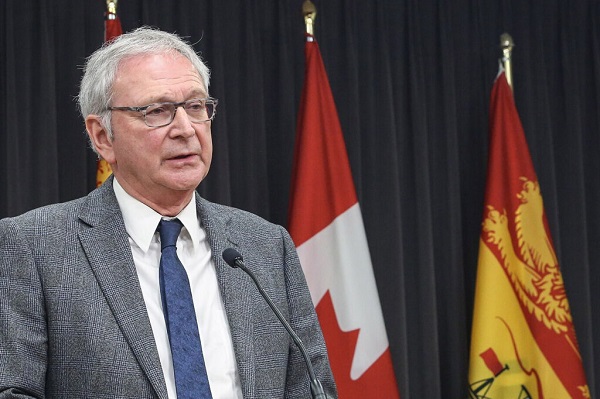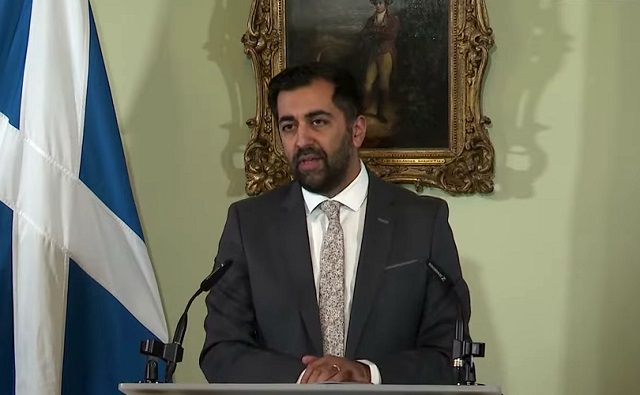Economy
NDP slated to back Conservative motion calling for nationwide pause on home heating carbon tax
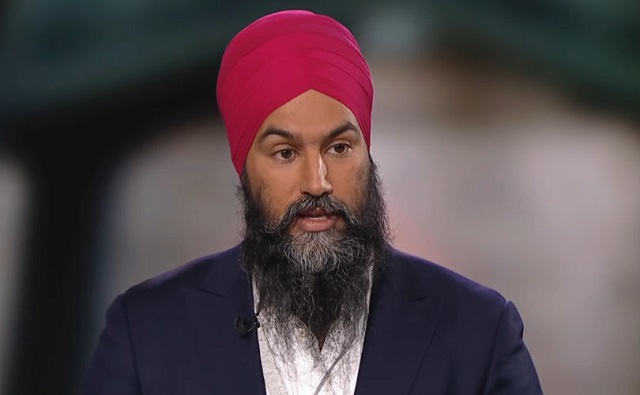
From LifeSiteNews
‘The reality is we have people who are struggling to make ends meet— to heat their homes during the winter,’ NDP House leader Peter Julian told reporters Thursday, indicating the party’s support for the Conservatives’ motion.
In a rare turn of events, the New Democratic Party (NDP) is slated to vote in favor of a Conservative Party of Canada (CPC motion calling for a nationwide pause on the carbon tax applied to home heating fuel.
While the motion is non-binding, should the NDP vote in favor of the motion, it could force the federal government under Liberal Prime Minister Justin Trudeau to pause the tax for all Canadians, and could even open up the possibility of a future vote of non-confidence.
CPC MPs served a notice in the House of Commons that they will put to a vote, as early as this coming Monday, their motion which reads: “That given the government has announced a ‘temporary three-year pause’ to the federal carbon tax on home heating oil, the House call on the government to extend that pause to all forms of home heating.”
The motion was brought forth by CPC leader Pierre Poilievre on Tuesday of this week.
Trudeau announced last week he was pausing the collection of the carbon tax on home heating oil for three years, but only for Atlantic Canadian provinces. The current cost of the carbon tax on home heating fuel is 17 cents per liter. Most Canadians however heat their homes with clean-burning natural gas, a fuel which will not be exempted from the carbon tax.
Trudeau’s carbon tax pause for Atlantic Canada announcement came amid dismal polling numbers showing his government is likely to be defeated in a landslide by the Conservative Party come the next election.
Earlier this week, Poilievre dared Trudeau to call a “carbon tax” election so Canadians can decide for themselves if they want a government for or against a tax that has caused home heating bills to double in some provinces.
Trudeau claimed the Conservatives “still want to fight another election on denying climate change,” and that they are “wrong” as Canadians would vote Liberal again.
After he suggested Canadians would vote Liberal again, despite polls suggesting the party would lose badly if an election were called today, Poilievre hand gestured Trudeau to “bring it [an election].”
Trudeau has thus far rejected calls for giving carbon tax exemptions to other provinces.
NDP appears to support Conservative motion
The CPC’s motion appears to have the support of the NDP, an interesting development considering the deal they have with the Liberal Party. The Liberal Party has a minority government and formed an informal coalition with the NDP last year, with the latter agreeing to support and keep the former in power until the next election is mandated by law in 2025.
Yesterday, NDP House Leader Peter Julian told reporters, “The reality is we have people who are struggling to make ends meet— to heat their homes during the winter.”
“The panicked action of last week really needs to be adjusted so there are supports that go to people right across the country,” he said.
Julian added that Trudeau’s backtracking of the carbon tax for one region of the country is not fair for the rest of Canadians.
“It tends to disadvantage a lot of people,” he said.
Should the NDP vote in favor of the CPC motion, it should pass the House of Commons. It is unclear whether the Bloc Québecois are in favor of the motion.
Trudeau’s latest offering of a three-year pause on the carbon tax in Atlantic Canada has caused a major rift with oil and gas-rich western provinces, notably Alberta and Saskatchewan, and even Manitoba which has a new NDP government.
Saskatchewan Premier Scott Moe on Monday said his province will stop collecting a federal carbon tax on natural gas used to heat homes come January 1, 2024, unless it gets a similar tax break as the Atlantic Canadian provinces.
Alberta Premier Danielle Smith has said she will be looking into whether a Supreme Court challenge on the carbon tax is in order. She noted however that as Alberta has a deregulated energy industry, unlike Saskatchewan, she is not in a position to stop collecting the federal carbon tax.
LifeSiteNews reported earlier this month how Trudeau’s carbon tax is costing Canadians hundreds of dollars annually, as the rebates given out by the federal government are not enough to compensate for the increased fuel costs.
The Trudeau government’s current environmental goals – in lockstep with the United Nations’ “2030 Agenda for Sustainable Development” – include phasing out coal-fired power plants, reducing fertilizer usage, and curbing natural gas use over the coming decades.
The reduction and eventual elimination of the use of so-called “fossil fuels” and a transition to unreliable “green” energy has also been pushed by the World Economic Forum (WEF) – the globalist group behind the socialist “Great Reset” agenda – an organization in which Trudeau and some of his cabinet are involved.
Send an urgent message to Canadian legislators urging them to stop more online censorship laws
Automotive
Governments in Canada accelerate EV ‘investments’ as automakers reverse course

From the Fraser Institute
Evidence continues to accrue that many of these “investments,” which are ultimately of course taxpayer funded, are risky ventures indeed.
Even as the much-vaunted electric vehicle (EV) transition slams into stiff headwinds, the Trudeau government and Ontario’s Ford government will pour another $5 billion in subsidies into Honda, which plans to build an EV battery plant and manufacture EVs in Ontario.
This comes on top of a long list of other such “investments” including $15 billion for Stellantis and LG Energy Solution, $13 billion for Volkswagen (with a real cost to Ottawa of $16.3 billion, per the Parliamentary Budget Officer), a combined $4.24 billion (federal/Quebec split) to Northvolt, a Swedish battery maker, and a combined $644 million (federal/Quebec split) to Ford Motor Company to build a cathode manufacturing plant in Quebec.
All this government subsidizing is of course meant to help remake the automobile, with the Trudeau government mandating that 100 per cent of new passenger vehicles and light trucks sold in Canada be zero-emission by 2035. But evidence continues to accrue that many of these “investments,” which are ultimately of course taxpayer funded, are risky ventures indeed.
As the Wall Street Journal notes, Tesla, the biggest EV maker in the United States, has seen its share prices plummet (down 41 per cent this year) as the company struggles to sell its vehicles at the pace of previous years when first-adopters jumped into the EV market. Some would-be EV makers or users are postponing their own EV investments. Ford has killed it’s electric F-150 pickup truck, Hertz is dumping one-third of its fleet of EV rental vehicles, and Swedish EV company Polestar dropped 15 per cent of its global work force while Tesla is cutting 10 per cent of its global staff.
And in the U.S., a much larger potential market for EVs, a recent Gallup poll shows a market turning frosty. The percentage of Americans polled by Gallup who said they’re seriously considering buying an EV has been declining from 12 per cent in 2023 to 9 per cent in 2024. Even more troubling for would-be EV sellers is that only 35 per cent of poll respondents in 2024 said they “might consider” buying an EV in the future. That number is down from 43 per cent in 2023.
Overall, according to Gallup, “less than half of adults, 44 per cent, now say they are either seriously considering or might consider buying an EV in the future, down from 55 per cent in 2023, while the proportion not intending to buy one has increased from 41 per cent to 48 per cent.” In other words, in a future where government wants sellers to only sell EVs, almost half the U.S. public doesn’t want to buy one.
And yet, Canada’s governments are hitting the gas pedal on EVs, putting the hard-earned capital of Canadian taxpayers at significant risk. A smart government would have its finger in the wind and would slow down when faced with road bumps. It might even reset its GPS and change the course of its 2035 EV mandate for vehicles few motorists want to buy.
Author:
Automotive
Red States Sue California and the Biden Administration to Halt Electric Truck Mandates

From Heartland Daily News
By Nick Pope
“California and an unaccountable EPA are trying to transform our national trucking industry and supply chain infrastructure. This effort—coming at a time of heightened inflation and with an already-strained electrical grid—will devastate the trucking and logistics industry, raise prices for customers, and impact untold number of jobs across Nebraska and the country”
Large coalitions of red states are suing regulators in Washington, D.C., and California over rules designed to effectively require increases in electric vehicle (EV) adoption.
Nebraska is leading a 24-state coalition in a lawsuit against the Environmental Protection Agency’s (EPA) recently-finalized emissions standards for heavy-duty vehicles in the U.S. Court of Appeals for the D.C. Circuit, and a 17-state coalition suing the state of California in the U.S. District Court for the Eastern District of California over its Advanced Clean Fleet rules. Both regulations would increase the number of heavy-duty EVs on the road, a development that could cause serious disruptions and cost increases across the U.S. economy, as supply chain and trucking sector experts have previously told the Daily Caller News Foundation.
“California and an unaccountable EPA are trying to transform our national trucking industry and supply chain infrastructure. This effort—coming at a time of heightened inflation and with an already-strained electrical grid—will devastate the trucking and logistics industry, raise prices for customers, and impact untold number of jobs across Nebraska and the country,” Republican Nebraska Attorney General Mike Hilgers said in a statement. “Neither California nor the EPA has the constitutional power to dictate these nationwide rules to Americans. I am proud to lead our efforts to stop these unconstitutional attempts to remake our economy and am grateful to our sister states for joining our coalitions.”
(RELATED: New Analysis Shows Just How Bad Electric Trucks Are For Business)
While specifics vary depending on the type of heavy-duty vehicle, EPA’s emissions standards will effectively mandate that EVs make up 60% of new urban delivery trucks and 25% of long-haul tractors sold by 2032, according to The Wall Street Journal. The agency has also pushed aggressive emissions standards for light- and medium-duty vehicles that will similarly force an increase in EVs’ share of new car sales over the next decade.
California’s Advanced Clean Fleet rules, meanwhile, will require that 100% of trucks sold in the state will be zero-emissions models starting in 2036, according to the California Air Resources Board (CARB). While not federal, the California rules are of importance to other states because there are numerous other states who follow California’s emissions standards, which can be tighter than those required by the EPA and other federal agencies.
Critics fear that this dynamic will effectively enable California to set national policies and nudge manufacturers in the direction of EVs at a greater rate and scale than the Biden administration is pursuing.
Trucking industry and supply chain experts have previously told the DCNF that both regulations threaten to cause serious problems for the country’s supply chains and wider economy given that the technology for electric and zero-emissions trucks is simply not yet ready to be mandated at scale, among other issues.
Neither CARB nor the EPA responded immediately to requests for comment.
Nick Pope is a contributor to The Daily Caller News Service.
Originally published by The Daily Caller. Republished with permission.
-
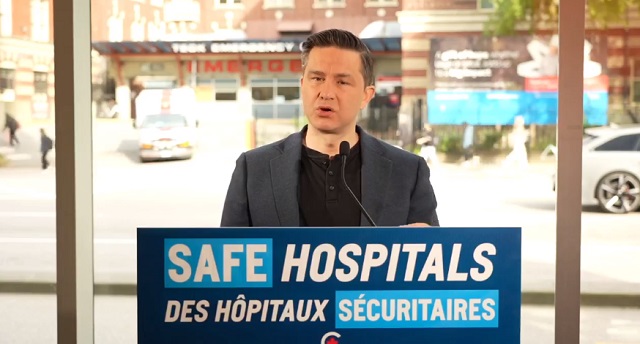
 Addictions2 days ago
Addictions2 days agoPoilievre attacks decriminalization of hard drugs with Safe Hospitals Act
-

 Uncategorized2 days ago
Uncategorized2 days agoRCMP recruitment failure has Alberta advocacy group calling for Provincial Police Service
-

 Alberta17 hours ago
Alberta17 hours agoPharmacist-led clinics improve access to health care: Lessons from Alberta
-

 Health2 days ago
Health2 days agoPrivate Footage Reveals Leading Medical Org’s Efforts To ‘Normalize’ Gender Ideology
-

 Alberta2 days ago
Alberta2 days agoRed Deer Hospital Lottery – Second Chance Early Bird Prize!!!
-
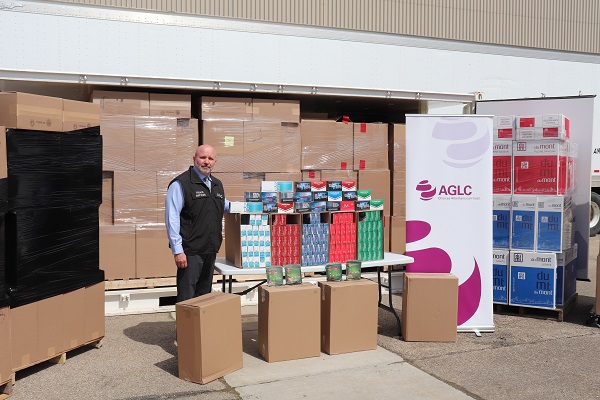
 Alberta13 hours ago
Alberta13 hours ago30 million contraband cigarettes valued at $25 million dollars seized in Alberta
-

 armed forces2 days ago
armed forces2 days agoTrudeau government has spent $10 million promoting DEI in the military as recruitment flounders
-

 COVID-191 day ago
COVID-191 day agoMore victories for freedom as ArriveCAN charges dropped and fines reduced



